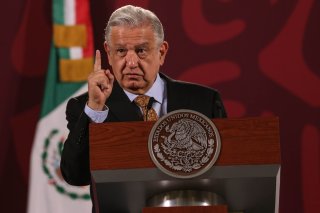Why is Mexico Helping to Solve Biden’s Border Problem?
Mexico’s President Andrés Manuel López Obrador has picked his side in the November U.S. election.
Extorted by Trump, Congressional Republicans in February rejected their own border security legislation—abandoning months of bipartisan negotiations—just to bedevil Biden. They scored a bull’s-eye. Biden’s slew of border initiatives has failed to diminish the lure posed by the U.S. catch-and-release protocol for the millions seeking better lives. It is the Republican’s top campaign issue. House Speaker Mike Johnson termed the border an “open sewer.” And Trump describes unauthorized migrants as “animals,” their border crossings an “invasion” orchestrated by Biden. The border has become the top issue in many swing states, with forty-two percent holding Biden fully responsible and 19 percent partially responsible.
A Mexican Lifeline
A hamstrung Biden’s best option now to slow border crossings is for Mexican President Andrés Manuel López Obrador to clamp down on migrants within his own borders. He has been successfully courting Lopez Obrador, catching Republicans by surprise. Since December, the Mexican President has responded with policies that reduced border crossings in January compared to December. And for the first time in seven years, crossings dropped further in March, indicating that Lopez Obrador has picked sides in the November election. Outsourcing border security to Lopez Obrador (and possibly his hand-picked successor, Claudia Sheinbaum, after the September elections) gives them considerable leverage over Biden. However, it also affirms that Trump is his own worst enemy.
Biden is a traditional diplomatic interlocutor somewhat sympathetic to the immigrant experience, who can be expected to accommodate some Mexican policy hopes if reelected. In contrast, Trump is utterly untrustworthy from the Mexican perspective. Lopez Obrador came quickly to recognize his odious character during Trump’s first term. Since at least 2017, the former has been offended by Trump’s racism—routinely dehumanizing Mexican and other migrants as “prisoners, murderers, drug dealers, mental patients and terrorists, the worst they have.”
Lopez Obrador’s relationship during Trump’s first term was subservient and entirely one-way. His single White House visit was as a 2020 campaign prop. Moreover, rewarding Trump now by engineering a cross-border surge would gain nothing. If elected, Trump is certain to browbeat Sheinbaum regardless, demanding draconian internal Mexican barriers to keep migrants away from the border. New tariffs and even renewed talk of U.S. troop incursions will be threatened in a replay of the bullying that characterized Trump’s first term.
The Cartel Challenge
A final consideration for Lopez Obrador is that Biden is far less erratic than Trump and can work as an effective collaborator in dealing with the existential danger posed by the Mexican drug cartels. Massive (boasting 175,000 employees), agile, and increasingly partnering with Chinese crime organizations, cartels are Lopez Obrador’s key domestic challenge to the rule of law. Their extortion and seizure of legitimate businesses and supply chains, like fisheries, saps the nation’s entrepreneurial and innovative spirit—in addition to the harm engendered by smuggling lethal fentanyl to the United States. They are ruthless, including the assassination of political reformers and at least fourteen political candidates during Lopez Obrador’s term. They are also responsible for widespread government corruption and intimidation designed to insulate their business model.
Corrupt and inept policing agencies have proven ineffective against the cartels, with roots deep throughout the Mexican economy and society. Consequently, Lopez Obrador has increasingly relied on an expanded deployment of his military, weakening democratic safeguards. Even so, Mexico’s homicide rate is three times that of the United States, with very few arrests. His policy failures will leave a violent and complex array of problems for Sheinbaum.
As explored by the Brookings Institution, Mexico desperately needs an infusion of resources to upgrade its domestic law enforcement institutions, including expanded investigative and prosecutorial capabilities. It also needs support in engaging with Chinese law enforcement agencies. The cartels fear the depth and lethality of U.S. law enforcement and the honesty of its judiciary. And Lopez Obrador has seemingly (but accurately) surmised that a renewed Biden administration is far more likely to respond to that desperate plight with synchronized policies and expansive support than another Trump one.
George Tyler is a former deputy assistant treasury secretary and World Bank official. He is the author of books including Billionaire Democracy: The Hijacking of the American Political System and What Went Wrong: How the 1% Hijacked the American Middle Class and What Other Countries Got Right.
Image: Shutterstock.com.

